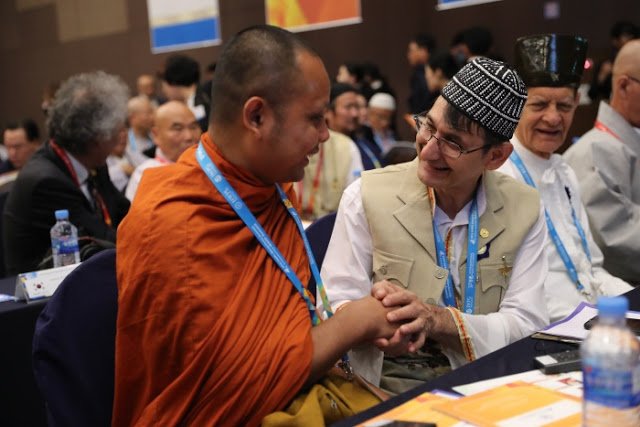The Era of Religion
Never Fades Away
Never Fades Away
Since the bombings of the World Trade Centre on September 11
close to two decades ago, the rise of extremism and the acts of violence in the
name of religion have grown rapidly across the world. Today, we see that there
have been a series of bombing and shootouts and places of worship are no longer
seen as sacred, but rather as targets. These events have brought concerns over
religion to the forefront and have inspired the international community to
create platforms for dialogue in search of the role religion can play in realizing
global peace and security.
close to two decades ago, the rise of extremism and the acts of violence in the
name of religion have grown rapidly across the world. Today, we see that there
have been a series of bombing and shootouts and places of worship are no longer
seen as sacred, but rather as targets. These events have brought concerns over
religion to the forefront and have inspired the international community to
create platforms for dialogue in search of the role religion can play in realizing
global peace and security.
A Platform for
Comparative Studies on Religious Scripture – World Alliance of Religions’ Peace
(WARP) Office
Comparative Studies on Religious Scripture – World Alliance of Religions’ Peace
(WARP) Office
As a new attempt, a platform for religious leaders to
establish a network of peace with the aim of enhancing understanding of
religions through scriptures has been carried out in 220 locations from 130
countries. The “World Alliance of Religions’ Peace (WARP) Office”, is a platform
established in 2014 by an international NGO named Heavenly Culture, World
Peace, Restoration of Light (HWPL) which works to find the nature of religious
values for peacebuilding through scriptures. HWPL is registered under the UN
ECOSOC, it has its headquarters in Seoul, South Korea and seeks the role of
religion in conflict resolution and prevention through the network of global
religious leaders.
establish a network of peace with the aim of enhancing understanding of
religions through scriptures has been carried out in 220 locations from 130
countries. The “World Alliance of Religions’ Peace (WARP) Office”, is a platform
established in 2014 by an international NGO named Heavenly Culture, World
Peace, Restoration of Light (HWPL) which works to find the nature of religious
values for peacebuilding through scriptures. HWPL is registered under the UN
ECOSOC, it has its headquarters in Seoul, South Korea and seeks the role of
religion in conflict resolution and prevention through the network of global
religious leaders.
In the month of April, an international conference named “The Role of Cultural Diplomacy in Approaching the Protracted
Conflicts” was held in Romania alongside HWPL. At the event, Chairman Lee of
HWPL shared that: “Through the WARP offices, religious leaders bring their
religious scriptures to examine trustworthy, physical evidence of religion.
These comparative studies have been put in place to ensure that there are no
more wars that will be triggered by religion.” The Chairman also added that the
culture of earth cannot disguise the one of heaven with a man’s
yardstick of judgment and that religion is to learn the world of spirit and
teachings of God. “This is the heavenly culture that guides us to the world of
peace,” Chairman Lee shared.
Conflicts” was held in Romania alongside HWPL. At the event, Chairman Lee of
HWPL shared that: “Through the WARP offices, religious leaders bring their
religious scriptures to examine trustworthy, physical evidence of religion.
These comparative studies have been put in place to ensure that there are no
more wars that will be triggered by religion.” The Chairman also added that the
culture of earth cannot disguise the one of heaven with a man’s
yardstick of judgment and that religion is to learn the world of spirit and
teachings of God. “This is the heavenly culture that guides us to the world of
peace,” Chairman Lee shared.
The religious network of peace has been further developed to
appeal to the young generation and to build the confidence of religion through
communication and understanding. “Various religious teaching program for youth
such as religious youth peace camp gives lesson for participants to learn about
the general history of world religions, find the root cause of and plausible
resolutions to religious conflicts and disputes, examine the religious
community’s roles for peace, and experience cultural exchanges,” said Dr. Ahmed
Jasem Hmood Al-Maliky, Sheikh of Office of the Religious Reference Sheikh
Mohammad Al Yaqoobi in Iraq.
appeal to the young generation and to build the confidence of religion through
communication and understanding. “Various religious teaching program for youth
such as religious youth peace camp gives lesson for participants to learn about
the general history of world religions, find the root cause of and plausible
resolutions to religious conflicts and disputes, examine the religious
community’s roles for peace, and experience cultural exchanges,” said Dr. Ahmed
Jasem Hmood Al-Maliky, Sheikh of Office of the Religious Reference Sheikh
Mohammad Al Yaqoobi in Iraq.

